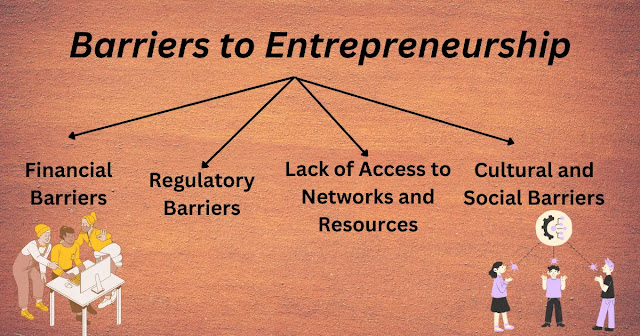Last updated on February 7th, 2026 at 09:51 am
Have you ever dreamed of starting your own business? The idea of turning your passion into a successful venture is exciting for many people. However, while entrepreneurship is important for economic growth and job creation, it comes with its own set of challenges. From finding the necessary funding to dealing with rules and regulations, the journey of becoming an entrepreneur can be tough.
But don’t worry! By understanding these challenges and learning how to overcome them, you can greatly improve your chances of making your business dreams come true.
This article will explore the main barriers to entrepreneurship, including financial, regulatory, networking, and cultural obstacles, and share practical tips to help you navigate these challenges.
Key Takeaways:
- Financial Barriers can be eased through alternative funding options like crowdfunding and government grants while bootstrapping can help you grow gradually.
- Regulatory Barriers can be navigated with professional help, staying informed about changes, and using technology to simplify compliance.
- Lack of Access to Networks and Resources can be overcome by joining entrepreneurial communities, attending networking events, and finding mentors.
- Cultural and Social Barriers can be addressed by changing societal attitudes, promoting entrepreneurship education, and building diverse support networks.
What Are the Barriers to Entrepreneurship?
2. Regulatory Barriers
3. Lack of Access to Networks and Resources
4. Cultural and Social Barriers
By understanding each of these barriers, entrepreneurs can find solutions that work for them.
1. Financial Barriers:
Traditional funding sources, like bank loans, can be hard to access, especially for first-time entrepreneurs. Additionally, venture capitalists often prefer to invest in businesses that have already shown some level of success.
How to Overcome Financial Barriers:
- Explore Alternative Funding Sources: Look into crowdfunding platforms like Kickstarter or GoFundMe, or seek angel investors and venture capital.
- Bootstrap Your Business: Start small and reinvest profits to grow your business slowly without needing outside funding.
- Access Government Grants and Loans: Many governments offer grants or low-interest loans to support small businesses.
- Create a Strong Business Plan: A solid business plan can help convince funders that your business has growth potential.
Case Study
According to the World Bank’s 2023 Doing Business Report, businesses often spend over 30% of their time navigating regulatory red tape.
How to Overcome Regulatory Barriers:
- Seek Professional Guidance: Lawyers and accountants can help you understand and comply with local and federal regulations.
- Stay Informed: Keep up with industry regulations to avoid penalties and delays.
- Leverage Technology: Use tools to simplify regulatory tasks and save time.
- Advocate for Change: Join business groups that push for reforms to make the regulatory environment easier for startups.
3. Lack of Access to Networks and Resources:
A Kauffman Foundation study found that entrepreneurs with access to a strong network are 50% more likely to succeed than those without it.
How to Overcome Networking Barriers:
- Join Entrepreneurial Communities: Attend industry events and networking gatherings to meet other entrepreneurs.
- Use Social Media: Use platforms like LinkedIn to connect with industry leaders and potential collaborators.
- Find a Mentor: Find experienced entrepreneurs who are willing to guide you.
- Work in Co-working Spaces: These spaces provide networking opportunities with other entrepreneurs and freelancers.
Networking Strategy Tips
- Be Genuine: When networking, focus on building genuine relationships rather than just seeking help.
- Follow-up: After meeting someone, send a quick message to stay connected and express gratitude.

Barriers to Entrepreneurship: Key Tips to Overcome Challenges
4. Cultural and Social Barriers:
According to a 2022 International Labor Organization (ILO) report, women entrepreneurs face obstacles that are 30% higher than those faced by men.
How to Overcome Cultural and Social Barriers:
- Shift Mindsets: Learn to see failure as an opportunity to grow. Many successful entrepreneurs, like Elon Musk, talk about the lessons learned from their failures.
- Promote Entrepreneurship Education: Community programs can help raise awareness about the benefits of entrepreneurship.
- Create Supportive Networks: Encourage diversity in entrepreneurial communities to help overcome biases.
- Collaborate Globally: If local cultural norms are limiting, consider expanding into markets that are more supportive of entrepreneurship.
Additional Resources
- Funding Resources: Platforms like Kickstarter, Indiegogo, and GoFundMe for crowdfunding. Look into local government websites for grants and loans available for small businesses.
- Legal Guidance: Websites like the Small Business Administration (SBA) provide resources on business licenses and permits.
- Networking Platforms: Join groups on Meetup or LinkedIn to connect with other entrepreneurs.

Barriers to Entrepreneurship: Key Tips to Overcome Challenges
Common Myths About Entrepreneurship
2. You Have to Be an Expert: Passion and willingness to learn can be just as important as expertise.
Conclusion
While the barriers to entrepreneurship are real, they are not impossible to overcome. By understanding these challenges and taking proactive steps to address them, entrepreneurs can improve their chances of success. Whether it’s securing funding, navigating regulations, building networks, or overcoming cultural biases, there are many ways to tackle the obstacles that stand in the way of entrepreneurship.
Final Thought:
FAQs:
What are the main barriers to entrepreneurship?
The main barriers include financial and regulatory barriers, a lack of network access, and cultural/social obstacles.
How can I find funding for my startup?
Consider exploring crowdfunding, angel investors, and government grants. Creating a solid business plan can also attract potential investors.
What are some effective networking strategies for entrepreneurs?
Join entrepreneurial communities, attend industry events, and leverage social media platforms like LinkedIn to make connections.
How do cultural attitudes impact entrepreneurship?
Cultural attitudes can create psychological barriers, such as stigma around failure or pressure to adhere to traditional career paths.
Are there resources available for new entrepreneurs?
Yes, many resources exist, including crowdfunding platforms, government grants, legal guidance from websites like the SBA, and networking opportunities through local organizations.




